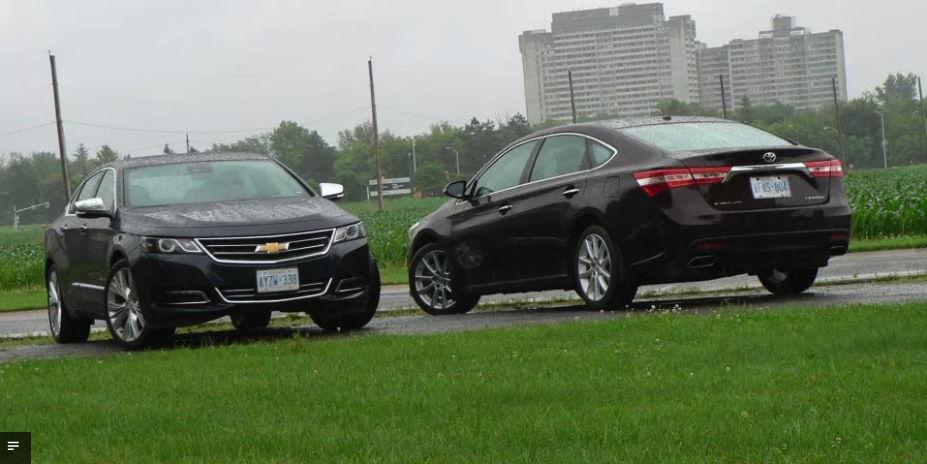Comparo: 2014 Chevrolet Impala vs. 2014 Toyota Avalon

Story and photo by John LeBlanc
Over the past half-century, just as light hikers have replaced wingtip brogues as acceptable men’s office footwear and smartphones have replaced eight-millimetre movie cameras, the ubiquitous crossover-utility-vehicle has supplanted the full-size four-door sedan as the choice for family transportation.
But along with the recently up-sized Volkswagen Passat and all-new Kia Cadenza, the redesigned-for-2014 Chevrolet Impala and recently redesigned Toyota Avalon signal a sudden revival of the large, four-door family sedan in the new car market — a segment previously limited to the high-end luxury crowd, fleet managers or retirees. With loaded examples of the Impala and Avalon at my disposal, I ventured to find out which one was the better family CUV substitute:
FIRST PLACE: 2014 Chevrolet Impala LTZ V6
Fifty years ago, the Impala set an all-time annual sales record of more than one million sold in the United States. Chevrolet isn’t delusional enough to think sales of its full-size sedan will reach that number again anytime soon. Chevy wants the new 2014 version to shed its commercial fleet image and broaden its appeal with more style, room, comfort and features than its venerable predecessor. And based on the top line, $41,345 (all prices include freight and pre-delivery inspection fees) Impala LTZ V6 I drove, I’d say mission accomplished.
The front-wheel-drive, five-passenger Chevrolet four-door feels more expensive than its sticker. It helps a lot that it shares its architecture with parent General Motors’ upscale Buick LaCrosse and Cadillac XTS sedans. Case in point: My Impala LTZ V6 tester came with oodles of luxury car features like heated and cooled front seats, rear cross-traffic alert, adaptive cruise control, collision mitigation braking and a state-of-the-art infotainment system with voice recognition, plus more.
While there are few discernible differences between this pair of Rubenesque sedans in regards to interior trim panel fits, the Chevrolet’s cockpit materials feel and look more upscale than some of the Toyota’s shinier plastics. Despite all the high-tech goodies, the Impala’s cockpit is much more user-friendly than the Avalon. At just over six inches in size, the Toyota’s central screen is smaller and harder to activate than the Impala’s larger MyLink infotainment unit. And to get to the Toyota’s navigation system, for instance, you have to dig deep into its Entune system’s “app” function.
I’m guessing Toyota went searching for younger (e.g. not cashing Canada Pension Plan cheques) buyers with a harsh ride in the new Avalon. Personally, I preferred the Impala’s better balance of a smooth ride and confident handling that’s more appropriate for the targeted family buyer. Also, the Chevy is quieter at highway speeds, with noticeably less tire and road noise than the Toyota. And for longer drives, the Impala’s front seats were more comfortable and supportive on my rear end than the Avalon’s flatter thrones.
Finally, here’s what sold me on the 2014 Chevrolet Impala as a better family car than the Toyota Avalon: more families can afford it. You don’t have to pop for the high-end LTZ, as a well-appointed four-cylinder Impala starts at $30,145, whereas the Avalon comes only with a V6, beginning at $38,975.
SECOND PLACE: 2014 Toyota Avalon Limited
If I say, “Toyota family sedan,” you’re more than likely to spit out “Camry!” Fair enough. But if you need more room and/or more luxury features than the popular Toyota midsize four-door, the Japanese automaker would like to point you in the direction of the Avalon, a vehicle celebrating its 20th birthday this year.
As has been the case since 1994, the front-wheel-drive, five-passenger Avalon four-door is a stretched version of the Camry, offering more interior room and rear trunk space over its smaller sedan sibling. The Avalon and Impala share similar wheelbase lengths. However, the big Toyota sedan isn’t as roomy as the big Chevy sedan. The Impala offers 532 litres of trunk space (versus the Avalon’s 453), and the Chevy’s rear seats fold for longer objects; the Toyota’s do not, leaving only a fold-down centre armrest with a pass-through to handle more extended objects.
Like the mainstream-branded Impala, the Toyota sedan benefits from being developed alongside a luxury branded stablemate, as in the Lexus ES. That means my top-line $44,020 Avalon Limited (including the Premium package) offers such niceties as heated rear seats, power rear window shade and dynamic radar cruise control.
American families can opt for a gas-electric hybrid version of the Avalon. In Canada, though, the big Toyota four-door only comes with a six-cylinder gas engine and a six-speed automatic transmission. Shared with the midsize Toyota Camry sedan, the Avalon’s V6 puts out 268 horsepower and 248 pound-feet of torque. That’s substantially less than the Impala V6’s 305 horsepower and 264 pound-feet of torque ratings, but the Avalon weighs considerably less, too — 1,650 kilograms versus 1,754 for the Chevy. That allows both sedans to post zero to 100 kilometres per hour times in the 6.5 seconds range. It also makes the Toyota a bit more fuel-efficient, rated at 9.9 L/100 km in the city and 6.4 on the highway. The Chevrolet scores a less impressive 11.1 and 6.9, respectively.
Feel free to buy the 2014 Toyota Avalon if you want the slightly better than average fuel economy, Lexus-like luxury features, and sharper-than-average handling. But overall, I’d recommend one of the less expensive 2014 Chevrolet Impala models for your next big, family sedan purchase.





![[del.icio.us]](https://www.straight-six.com/wp-content/plugins/bookmarkify/delicious.png)
![[Digg]](https://www.straight-six.com/wp-content/plugins/bookmarkify/digg.png)
![[Facebook]](https://www.straight-six.com/wp-content/plugins/bookmarkify/facebook.png)
![[Google]](https://www.straight-six.com/wp-content/plugins/bookmarkify/google.png)
![[Reddit]](https://www.straight-six.com/wp-content/plugins/bookmarkify/reddit.png)
![[StumbleUpon]](https://www.straight-six.com/wp-content/plugins/bookmarkify/stumbleupon.png)
![[Twitter]](https://www.straight-six.com/wp-content/plugins/bookmarkify/twitter.png)
![[Email]](https://www.straight-six.com/wp-content/plugins/bookmarkify/email.png)